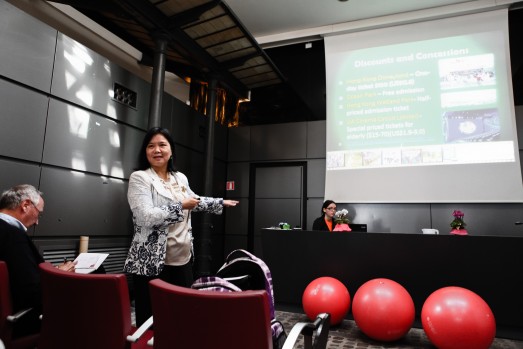Notes and quotes from MOVE Congress 2014 Workshop 4: Active ageing
14/11/2014

The fourth and final workshop of the MOVE Congress 2014, Active Ageing, delivered its promise of offering tools and advice to deliver effective physical activity initiatives for seniors. Miriam Schreck from Deutscher Turner-Bund (DTB) in Germany emphasised that fitting in with elderly people’s routines is both an important consideration and potential challenge for sports programme providers. When looking at sports facilities and clubs, providing qualified instructors, easy access to amenities, disabled access and an accepting environment are also essential:
“The elderly have a feeling of wanting to be needed, accepted and part of their community. If they feel comfortable in their sports club, they’ll be more willing to engage actively as members and in management positions.”
Remember to be flexible, she added, particularly when it comes to memberships:
“An elderly man once told me: ‘I don’t even buy three bananas at a time, so why should I buy a membership for a whole year?’”
Ariella Cuk, the leader of Comunicare Interculture in Italy, used the successful master swimming awareness campaign and over 60s event Lifelong Swimming, in Trieste, as an example clubs can take inspiration from to embrace elderly people’s interest in swimming. She emphasised adding seminars and workshops on healthy eating, safety and injuries to events, providing health points to let the participants monitor their conditions during the events and taking the competitive expectation out of the sport involved:
“Sport organisations should widen their perspectives and add a social element to the competitive element, which is their main focus. For example, it is important for swimming facilities to include recreational swimming in their programme,” Cuk said.
ISCA Asia Chair Professor Siu-Yin Cheung from Hong Kong offered a trans-continental perspective on promoting active ageing, explaining that the Chinese approach to physical activity is inherent in their daily routines:
“In Chinese culture elderly people go to the park in the morning to do Tai Chi. So it is a good idea to try to promote non-organised physical activity in parks for the elderly,” she said
As the Chairperson of the Gymnastics Association of Hong Kong, she has also had success in modifying activities for the elderly and creating events especially for them. The 107-year-old participant in the last general gymnastics festival was a testament to this approach – and to the participant’s positive approach to ageing:
“Age is about mind over matter,” Cheung said. “If you don’t mind, it doesn’t matter.”
By Rachel Payne
Posted on 14/11/2014 by Rachel Payne, ISCA

